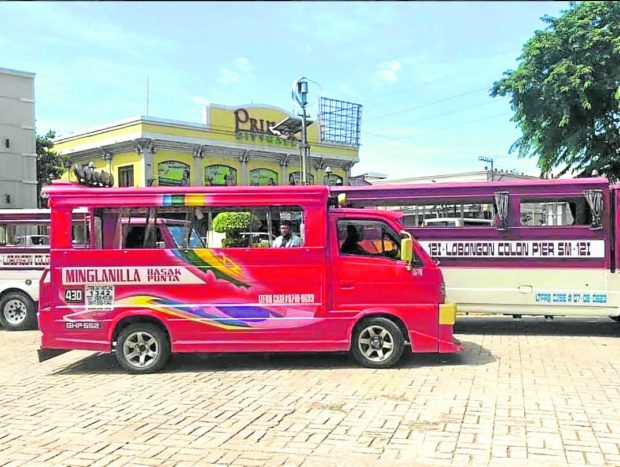
GONE NEXT YEAR These traditional or old public jeepneys in Cebu City Hall have until March 31, 2022, to ply the streets as part of the government’s public utility vehicle modernization program. —NESTLE SEMILLA
CEBU CITY, Cebu, Philippines — The iconic jeepneys, or the public utility vehicles (PUVs) that used to lord the streets, will become a thing of the past, not only displacing hundreds of drivers and operators but will also likely cause a public transport shortage in Metro Cebu, the Land Transportation Franchising and Regulatory Board (LTFRB) in Central Visayas said.
The LTFRB, on Friday, announced the total phaseout of old jeepneys starting on April 1, 2022.
Reynaldo Elnar, LTFRB assistant regional director, said he received a directive from their central office to prohibit traditional or old jeepneys from plying their routes in April next year as part of the government’s PUV modernization program, which required the phaseout of jeepneys and buses that are 15 years old.
The LTFRB, shortly after announcing the program in 2017, said all public transport operators would be required to replace their old PUVs with those that would be “designed to be environment-friendly, safe, secure and convenient with due consideration to persons with disabilities passengers.” The modern jeepneys also have to be air-conditioned and be equipped with global positioning system, or GPS, trackers.
The problem, according to Elnar, is that there are only 846 modernized jeepneys that are operating in Metro Cebu at present which could not support the volume of passengers in the Visayan metropolis, meaning that a phaseout of old jeepneys could lead to a transport shortage.
In fact, he said, even the combined number of traditional and modern jeepneys have not been able to serve the transport needs of Metro Cebu commuters.
“This cannot support the volume of passengers in Metro Cebu. That’s why our buses are still operating because the existing traditional and modern jeepneys cannot serve the demand of passengers,” Elnar said in his speech during the inauguration of 15 modern jeepneys in Talisay City on Dec. 10.
Metro Cebu, with a population of about 3 million, is the second most populated area in the country outside of Metro Manila. Cebu City alone has a population of nearly a million as of 2020.
Declining number
Before the COVID-19 pandemic struck in March 2020, Elnar said there were about 6,000 traditional jeepneys that operated in Metro Cebu.
The number is currently down to 2,000 units because of the inspection on road worthiness as well as the failure of the drivers to present the requirements from the local governments to prevent the spread of COVID-19.
Elnar said local governments in Central Visayas, particularly the highly urbanized Metro Cebu area, were tasked to prepare the local public transport route plan (LPTRP), which includes the number of vehicles in every route.
So far, only Mandaue City in Metro Cebu got an approved LPTRP from the LTFRB, he said.
At least 30 other local governments in Central Visayas have submitted their route plans, which were still being evaluated by the LTFRB, Elnar said.
According to Elnar, the Technical Education and Skills Development Authority, and the Department of Transportation would offer free training courses to operators and drivers affected by the vehicle modernization program.
The courses include driving, speed limiter installation, automotive servicing and automotive engine rebuilding.